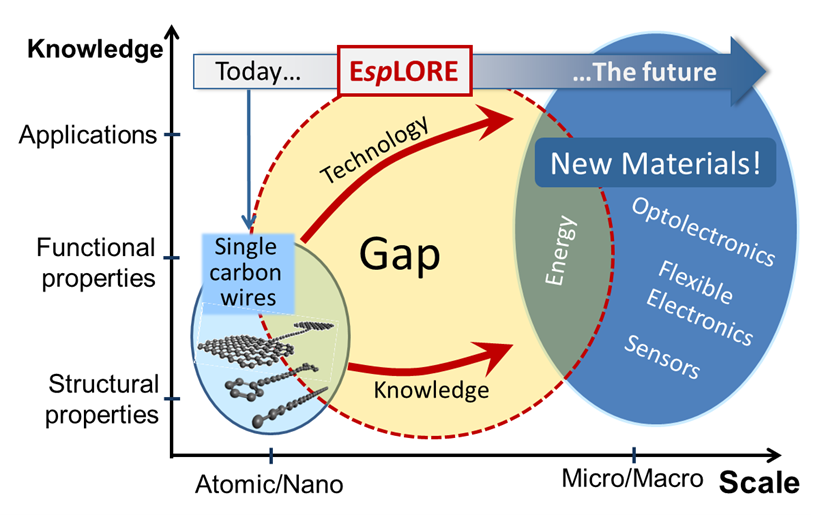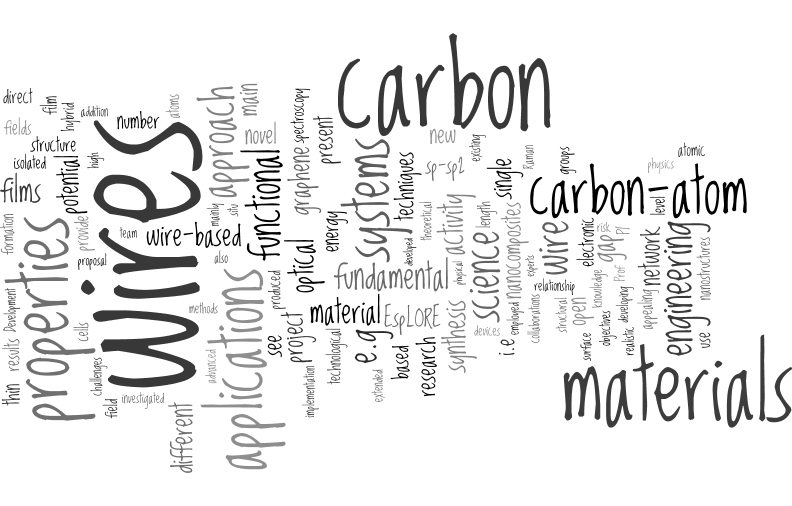The project EspLORE: Extending the science perspectives of linear wires of carbon atoms from fundamental research to emerging materials is a ERC 2016 Consolidator Grant (Grant N° 724610) funded for 5 years (2017-2022) by the European Reserach Council – ERC established by The European Commission.
 EspLORE aims at filling the large existing gap between the present knowledge of Carbon-atom wires (CAWs) as isolated structures and the potential applications of new functional CAW-based materials in an engineering-oriented approach. The core concept of EspLORE is to explore the applied science and engineering of new materials in the form of thin films and nanocomposites comprising or assembled from these structures. The main envisaged applications are in the field of direct energy conversion devices (e.g. photovoltaics, fuel cells, water splitting) but can also include electronics, optoelectronics, sensors and functional coatings.
EspLORE aims at filling the large existing gap between the present knowledge of Carbon-atom wires (CAWs) as isolated structures and the potential applications of new functional CAW-based materials in an engineering-oriented approach. The core concept of EspLORE is to explore the applied science and engineering of new materials in the form of thin films and nanocomposites comprising or assembled from these structures. The main envisaged applications are in the field of direct energy conversion devices (e.g. photovoltaics, fuel cells, water splitting) but can also include electronics, optoelectronics, sensors and functional coatings.
Why Carbon wires?
Computer calculations predict outstanding properties for carbon-atom wires:
- Exceptional mechanical properties make carbon wires the hardest material ever considered
- Huge effective surface
- Metal/Semiconducting/Insulating behaviour
- Superhigh thermal conductivity
- Very high electron mobility
- Very intense optical absorption
In nanoscale systems, properties can be tuned by controlling the length and the termination of the wire.This allows to have
- Tunable optical band-gap
- Insulator-to-metal transition
The simple atomic configuration leading to distinct and unique properties and the tuning capability achievable by structural control represent a great potential advantage in the design of systems with nano-engineered properties and open exciting opportunities in a number of engineering fields. In fact, as a result of recent achievements, it emerges that carbon-atom wires have all the potential to assume a leading role in material science and engineering as a new player in the family of carbon-based materials. The wide tunability of functional properties make sp-carbon-based materials a promising candidate for developing, in synergy with graphene and other carbon-based materials, ‘all-carbon’ solutions to technological challenges of the next future.
Why EspLORE?
There is at present a huge gap between the potential emerging from theoretical and fundamental works and an engineering-oriented approach addressing functional properties and applications. EspLORE wants to address this challenge by setting up a novel research activity merging competencies in different fields of physics, nanotechnology, materials science and engineering in a multidisciplinary approach able to cross the actual boundaries between the different disciplines and to bridge the gap between fundamental science and engineering.
